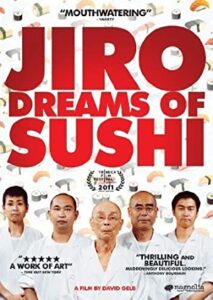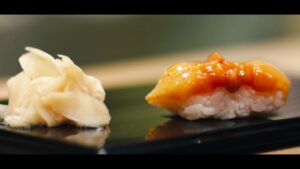Interview: David Gelb of “Jiro Dreams of Sushi”
Posted on March 7, 2012 at 3:56 pm

“Jiro Dreams of Sushi” is a documentary about a man who has devoted his entire life to his tiny 10-seat sushi restaurant, with results so transcendently delicious that the prestigious Michelin Guide says it is worth the trip to Japan to taste it. Customers sign up months in advance for a meal that costs $300. I think my favorite thing in the film is watching their hands. They’re so balletic in the way they move their hands and so strong. But the movie is about more than sushi; it is about the yearning to give ourselves to the search for perfection in whatever field we choose — or whatever field chooses us. I spoke to first-time director David Gelb about making the film and about how Jiro inspired him to view his film the way Jiro views his food.
I enjoyed your film very much and I had the reaction I’m sure everybody else did, which is that it made me very hungry. I have to begin by asking since you were the cinematographer as well as the director, how did you make the food look so luscious?
Well it’s just a testament to how beautiful his sushi is. I’d read that for Burger King commercials or McDonalds commercials they do a lot of make-up work on the food, but in this case the food just comes out looking beautiful. From a photographer’s point of view all that I had to do was to frame it nicely and use a selective focus to zero in the viewer’s eye on the most delicious part of the fish, be it the glistening of the tuna fat or the shimmer of the skin of the mackerel. It was just about guiding the viewer’s eye to the part that I think was most delicious.
You set yourself quite a difficult challenge because of the five senses, probably the most difficult one to convey on film is taste.
Yep.
Why did you decide to make a documentary about something that is so difficult to convey in cinema?
I think that it’s just that I love food and especially sushi. This was an opportunity to go to Japan and ply my trade, which is filmmaking, but at that same time be surrounded by some of the best food in the world and just eat really well and live the life of a Japanese sushi chef’s apprentice, just being there and being able to go to the fish market every day. I crave that kind of experience when I’m filming. Whenever I make a film I want to experience whatever it is that I’m shooting so I just wanted to run with the sushi chefs if you will.
http://www.youtube.com/watch?v=Hi1jxRanimUOne of the things that I think is so wonderful about this film is the way it transcends the specifics – the specifics are all great and it’s great to go see the market and the process and all of that, but it’s about loving what you do and giving yourself fully to it, and that applies to everybody. There was a line in the film where somebody says it’s very Japanese to have an apprenticeship that’s so painful. Did you get the sense that that’s a generational thing and that it’s less true of the current generation?
I think that Jiro’s restaurant represents the pinnacle in the sort of tradition of perfection in a restaurant. There are other restaurants like that as well, but it’s actually becoming very difficult to find young staff to subscribe to this kind of patience and to dedicate this amount of time to food because sushi chefs in the United States sometimes are being trained for three months, six months, and Jiro’s restaurant you have to wait ten years before they even let you make the egg sushi.
Yes you have to squeeze the towels!

Exactly. It requires a bit of patience and the apprentices aren’t paid that much because even though they’re charging a lot of money for the sushi, the overhead is extremely high because they’re getting the absolute best of every single ingredient every day. It’s an uphill battle for the future for sure because as apprentices leave they’re going to want to start their own careers and their own restaurants, and it’s becoming increasingly hard to replace them.
It’s becoming increasingly hard to replace the food as well and you touch on the issue of sustainability. What is the solution to that problem?
There’s really no easy answer to this problem of sustainability, specifically to Bluefin tuna. We included it in the film not only because I’m very concerned about it, but Jiro-san and Yoshikazu-san are very concerned about overfishing and bad fishing techniques because they want future generations to be able to enjoy sushi, but also the scarcity of tuna is driving up their costs and making their business almost unsustainable. A couple of the things that they specifically lament is the use of bottom trawling techniques where they drag nets across the bottom of the ocean and pick up pretty much everything. They pick up tuna, but they’re also picking up baby tuna and beds of fish eggs and other sea creatures that should not be harvested in that way. If you take all of the tuna out of the water there’s going to be no young tuna to replace them and so Jiro and Yoshikazu only use line-caught fish whenever possible. They think the fishing technique, this bottom trawling technique, should be banned. And it should be. In addition to that, they amazed at how often people are eating sushi. Yoshikazu says in the film that when he was a child, sushi was something that you would eat once every few months or once a year as a celebration. Now sushi is everywhere and it’s become very affordable, again because of this bottom trawling technique and they literally mine the tuna out of the ocean and blast freeze them like they’re basically a commodity. All of this is done to increase the profits and reduce the price so they can sell more of it to more people. I think what I’ve learned from Yoshikazu and Jiro is that the best way to eat sushi is to eat it less often, but when you do, go to a really good restaurant.
The very best, right?
Where they really are applying the craft and taking good care to make it really good.
Can you talk to me a little about your music choices, which I thought were very unusual to use this classical western style music? I guess some Philip Glass in there too. So tell me a little bit about your thoughts on that.
The biggest challenge when you’re shooting a film about a true genius and someone who is the best in their field is to try to elevate the elements of the movie so that they’re worthy of him. I lugged some of the best camera equipment available in the world to Japan so I could shoot the sushi in a way that would be appropriate to him. We wanted to use the best music as well, which is why we chose pieces by Mozart and Tchaikovsky, Bach, and Philip Glass. These are masters and some of the greatest composers in the world so I just thought it was a fit to try and bring everything up to Jiro’s level or as close to Jiro’s level as possible. And specifically Philip Glass’ music, and I only discovered this in hindsight, is that the Philip Glass music is actually a metaphor for Jiro’s work ethic because the music is repetitive yet always escalating and building and reaching new level and heights. Jiro comes to work every single day repeating the same process and repeating the same thing, but just looking for that little bit of improvement. I feel like that kind of matches the Philip Glass music quite beautifully.
 It was very interesting to me that Jiro-San compared himself to a French chef, which is really the opposite of sushi in terms of the number of ingredients, and the way you have all the different parts of the meal on the plate at the same time and all of that.
It was very interesting to me that Jiro-San compared himself to a French chef, which is really the opposite of sushi in terms of the number of ingredients, and the way you have all the different parts of the meal on the plate at the same time and all of that.
Sure sure, but I’ll make just one comment about Robuchon is that he is a chef where all the processes are there to enhance the basic purity of the flavour of the ingredient. He puts a whole stick of butter into his mashed potatoes, but only because the butter enhances the flavour of the potato. The philosophy is still kind of there and even though sushi seems so simple, that it’s just fish and rice, there’s great pain and work going into bringing that fish to its most delicious state and the same with the rice as well.
Tell me what observing his meticulous attention to detail, how that inspired you as a filmmaker.
His dogged pursuit of perfection even though he knows that he’ll attain it, I think that was something that was constantly echoing in the mind of me and the editor as we were putting the movie together. We were just always trying to make it better and better and better even if that meant taking a step back to take two steps forward. Some of the most painful parts of the editing were cutting out sections or scenes or characters that were incredibly compelling and beautiful and interesting, but were not helping the story as a whole. We had to make sure the whole individual scenes were going to create a whole that was greater than the sum of its parts. Sometimes if we would make a breakthrough in the story we would require moving large sections of edited material that we thought were fantastic. It was just really being willing to put in the extra work to just make the movie just slightly better. Sometimes just making that tiny bit of improvement requires a ton of work. The last 20% takes 50% of the effort. The closer that you get to the end, the further away the finish line seems to be all the time, and just like Jiro would do we would refuse to give up until we pretty much got there. But right when you cross the finish line you realize actually there’s another finish line way way down the field and we’ll have to attack that on the next movie.
